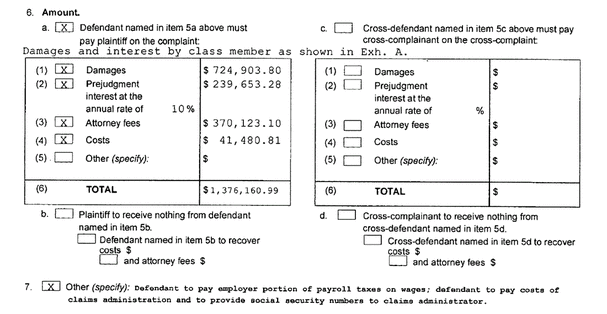Teamster front non-profit organization to profit from the attack on AB Trucking
Appeal
The appeal bond requirement can be very frustrating in cases where the judgment is very large relative to the defendant's liquid assets. Even though the defendant might have the judgment lowered or removed entirely on appeal, the cost of the bond might violate their right to due process of law by making the filing of an appeal impossible or overly burdensome.
This was roughly the argument used by Texaco in a similar situation rising out of Texas in the mid 1980s. Texaco initially succeeded in having the cost of the appeal bond lowered to facilitate its appeal, but the Supreme Court ultimately reversed this lower court decision and upheld the 120 percent Texas appeal bond requirement.
This leaves defendant/appellants very little recourse in a situation where the appeal bond cost is prohibitive. In some states, the trial judge or appellate court can lower the bond requirement, but this is hardly a sure thing. When the trial judge cut in half the cost of the appeal bond in a case where Philip Morris was ordered to pay $10.1 billion in settlements, the Court of Appeals reversed and had the judge reinstate the full amount of the appeal bond.
A minority states cap their appeal bond requirement somewhere between $25 million and $100 million, but this can be a controversial legislative solution since it blatantly favors large companies that have potential liability in excess of the cap. Certainly in the Texaco case, the large appeal bond cost was a major factor that led them in foregoing appeal and paying a settlement.
This was roughly the argument used by Texaco in a similar situation rising out of Texas in the mid 1980s. Texaco initially succeeded in having the cost of the appeal bond lowered to facilitate its appeal, but the Supreme Court ultimately reversed this lower court decision and upheld the 120 percent Texas appeal bond requirement.
This leaves defendant/appellants very little recourse in a situation where the appeal bond cost is prohibitive. In some states, the trial judge or appellate court can lower the bond requirement, but this is hardly a sure thing. When the trial judge cut in half the cost of the appeal bond in a case where Philip Morris was ordered to pay $10.1 billion in settlements, the Court of Appeals reversed and had the judge reinstate the full amount of the appeal bond.
A minority states cap their appeal bond requirement somewhere between $25 million and $100 million, but this can be a controversial legislative solution since it blatantly favors large companies that have potential liability in excess of the cap. Certainly in the Texaco case, the large appeal bond cost was a major factor that led them in foregoing appeal and paying a settlement.
Terms of the Bond
With virtually no exception, appeal bonds must be collateralized 100 percent. This means a defendant/appellant cannot put down a mere fraction of the bond amount and let the surety finance the remainder, as is the case in most surety bonds.
An appeal bond must be backed entirely by cash and/or other valuable assets. In other words, surety companies don't want to assume the risk of the plaintiff not paying the judgment any more than a plaintiff does, and if they did, it might not be a useful deterrent against frivolous appeals.
On top of that, most states, require an appeal bond to account for legal cost of defending against the appeal plus interest, an amount often set at 120 percent of the judgment. These strict terms for an appeal bond, however, can make an appeal difficult or impossible for a defendant. While a judgment can sometimes be paid in installments, it is difficult to do so for an appeals bond because there are time constraints on filing an appeal.
An appeal bond must be backed entirely by cash and/or other valuable assets. In other words, surety companies don't want to assume the risk of the plaintiff not paying the judgment any more than a plaintiff does, and if they did, it might not be a useful deterrent against frivolous appeals.
On top of that, most states, require an appeal bond to account for legal cost of defending against the appeal plus interest, an amount often set at 120 percent of the judgment. These strict terms for an appeal bond, however, can make an appeal difficult or impossible for a defendant. While a judgment can sometimes be paid in installments, it is difficult to do so for an appeals bond because there are time constraints on filing an appeal.

